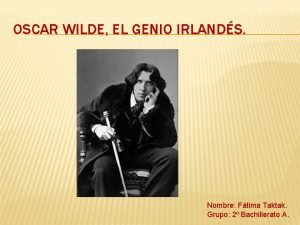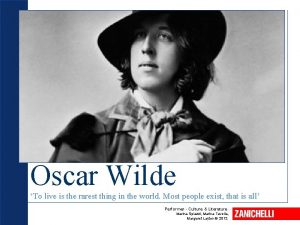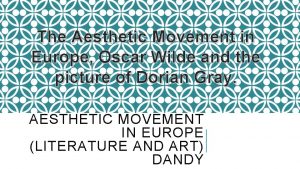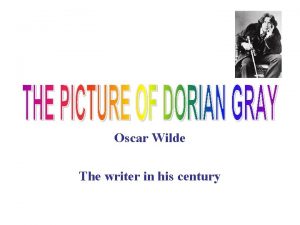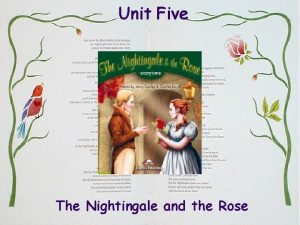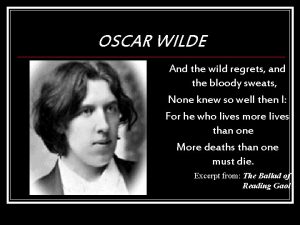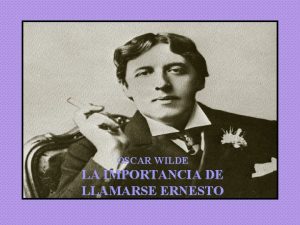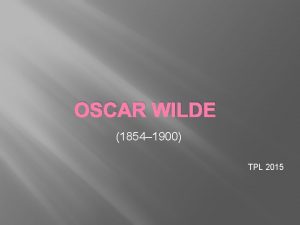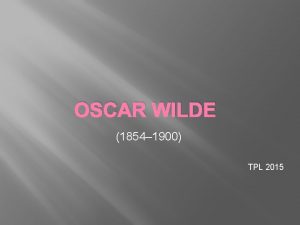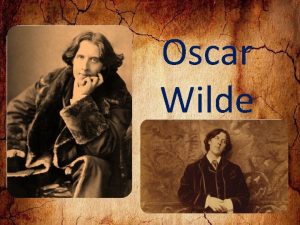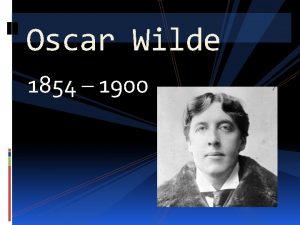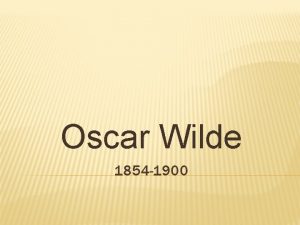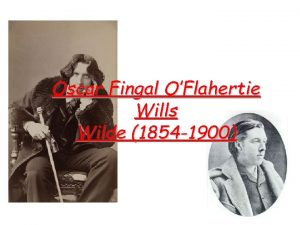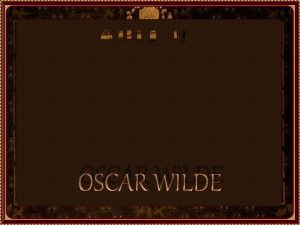Oscar Wilde 1854 1900 An Irish playwright he









- Slides: 9

Oscar Wilde (1854 - 1900) An Irish playwright, he become famous for his witty and sopisticathed society plays. A dandy and an aesthete, he used to dress in strange manners. He believed in the «Art for Art’s Sake» aesthetic theory, which inspired his controversial novel- The picture of Dorian Gray. His career was shattered by his imprisonment for homosexuality, which he described in a long poem of great intensity – De Profundis.

• Oscar Wilde was born in Dublin in 1854 Life • The family belonged to the wealthy Protestant minority • His father was a famous surgeon; his mother was a poet and translator • His mother was disappointed when Oscar, a second boy, was born and for a few years dressed him as a girl • He studied classics in the Trinity College (Dublin) and then in Magdalen College, Oxford • During this period he was influenced by John Ruskin – who was lecturing in art – and Walter Pater and his ideas of Aestheticism and he began to write • He became the spokesman for the school of ‘Art for Art’s sake’. He was an eccentric dandy and was famous for his wit and aphorisms • In 1882 he gave lectures in America and when he arrived in New York he said “I have nothing to declare but my genius”. Then he moved to Paris where he met Zola, Hugo, Balzac, Mallarmé… • In 1882 he married Constance Lloyd and had 2 children and his popularity increased and culminated in 1895, when he published the play The Importance of Being Earnest. However, that year, his relationship with Lord Alfred Douglas (“Bosie”) was fatal to him: he was accused of homosexual practices, was arrested and kept for two years at the Reading Jail. When he was released, he was a broken man. • He spent the rest of his life in Italy and France and died in poverty in Paris in 1900.

Literary production 1881 – His first volume of poems 1891 – Essays and other stories and his most famous novel, The Picture of Dorian Gray 1892 -5 – His greatest success was achieved through his comedies, like Salomé, An Ideal Husband The importance of being Earnest. In prison, he wrote his prose confession De Profundis, a letter to his lover Alfred Douglas

The Aesthetic Movement • Wilde believed in Walter Pater’s theory of Aestheticism. This theory stated that the meaning of life was in beauty and art. • Their motto was Art for Art’s sake. This meant that a work of art had no other purpose than its own beauty and perfection. Art needed not express anything but itself. It didn’t have to teach or denounce anything or have other social functions (no moral aims). Moreover according to the Aesthetes, LIFE ITSELF HAD TO BE LIVED BEAUTIFULLY, AS A WORK OF ART. • It was in contrast with the ideas that were widespread the Victorian age, dominated by rational and scientific thought and utilitarianism (what counts is what generates profit)

His life as a dandy Oscar Wilde took the principles of Aestheticism and brought them to the extremes, playing the role of a dandy. He became famous for his extravagant way of dressing, his witty conversation and his life of vice and pleasure, which made him very popular.

The Picture of Dorian Gray (1891) • Dorian Gray is an upper class young man of extraordinary beauty. A painter, Basil Hallward, is so impressed by his look that he decides to paint a portrait of him. • Thanks to the portrait , Dorian is for the first time in his life fully conscious of his own beauty, and he realizes with disappointment that the beauty of the portrait will last while his real beauty will fade. At this point, Dorian expresses the wish to stay beautiful forever, while the portrait will grow old and horrible in his place • Basil’s friend, Lord Henry Wotton, becomes the mentor of Dorian: he teaches him how to behave in the rich London and encourages him to fall in love with his own beauty. From that moment on, the veneration of his own beauty and a consecrated life to hedonism will be the only reference points in Dorian’s life.

• Dorian begins to frequent theatre and meets an actress, called Sybil Vane, who falls in love with him. When she stops acting to be with him, he cruelly refuses her. • When he looks at his portrait, he notices that his face has an expression of cruelty. He goes back to Sybil and finds out that she had killed herself. • Henry Wotton pushes him to enjoy the different aspects of a life of vice and sensual gratification. Years later, Dorian is completely corrupted and evil, but still looks like when he was young. • He shows Basil the changes in the portrait and Basil warns him that he will have to pay for his moral decline. To keep the secret of the portrait, Dorian kills Basil. • Dorian also has to kill other people to keep the secret. • The portrait becomes more and more ugly and Dorian decides to start a new life and destroys the portrait. But in doing so, he kills himself. The portrait goes back to its original aspect, while Dorian becomes an old disgusting man.

About beauty… You have a wonderfully beautiful face, Mr. Gray. Don't frown. You have. And beauty is a form of genius--is higher, indeed, than genius, as it needs no explanation. It is of the great facts of the world, like sunlight, or spring-time, or the reflection in dark waters of that silver shell we call the moon. It cannot be questioned. It has its divine right of sovereignty. It makes princes of those who have it. You smile? Ah! when you have lost it you won't smile. . People say sometimes that beauty is only superficial. That may be so, but at least it is not so superficial as thought is. To me, beauty is the wonder of wonders. It is only shallow people who do not judge by appearances. The true mystery of the world is the visible, not the invisible. . Yes, Mr. Gray, the gods have been good to you. But what the gods give they quickly take away. You have only a few years in which to live really, perfectly, and fully. (…)Live! Live the wonderful life that is in you! Let nothing be lost upon you. Be always searching for new sensations. Be afraid of nothing. . A new Hedonism--that is what our century wants. You might be its visible symbol.

Themes • Contrat Art-Life: superiority of art with its supreme aim concerning the cult of beauty. Beauty, as pure form, is the only reality that matters; the great abstractions, like truth, morality etc, are elusive and cannot be grasped. What we can grasp is form. Formal, that is artstic values, are therefore the only «real» values; • The myth of Faust: Dorian Gray can also be read as a version of the myth of Faust, presenting a man who loses his soul in return for eternal youth and beauty; • The motive of the «double» : the final stabbing of the picture and subsequent inversion of the roles can be read in more than one way: the triumph of art over life, because in the end it is the picture that survives in the glory of its beauty, but it can also signify the impossibility of a life pursuing sensual and intellectual delight with no acceptance of moral responsibility (hedonism).

